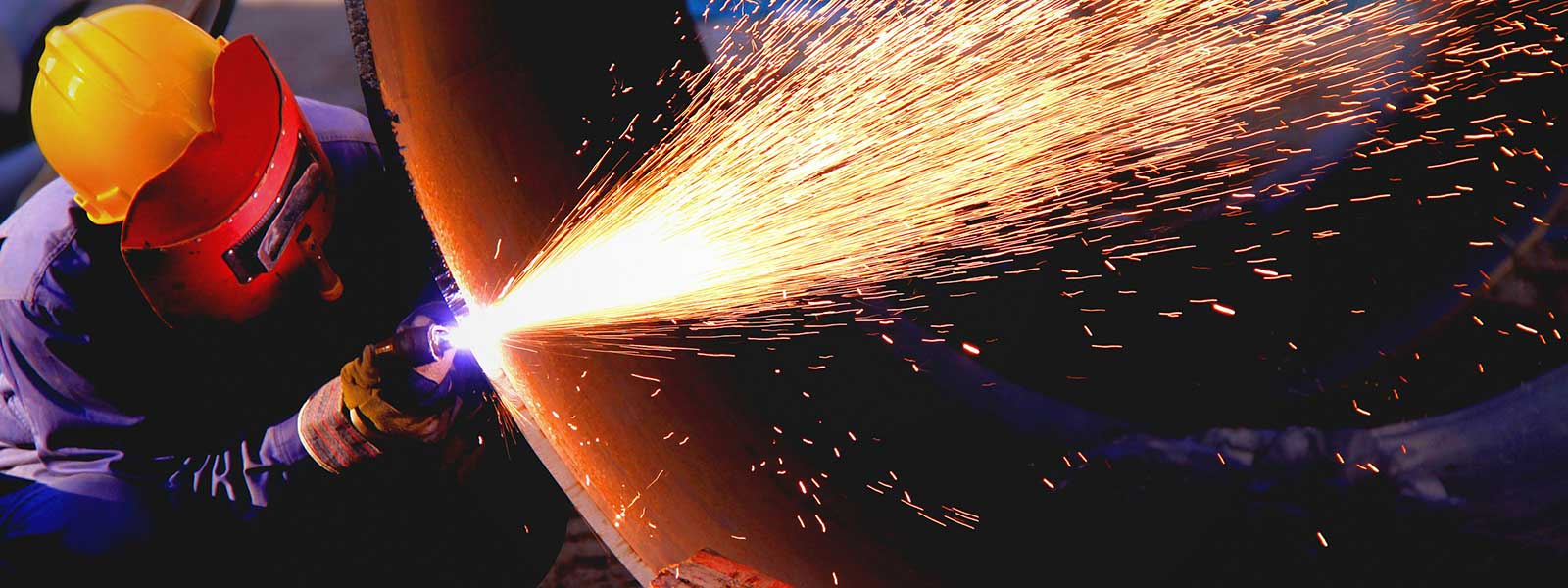Did you know that more than 50 percent of the products in the United States require welding at some point in their manufacturing process? That percentage includes computers, cell phones, oil rigs, bridges and ships. You might be able to infer that because so many things we use to succeed as a nation require welding that the necessity for welders is quite prevalent.
Your inference would be correct. There is a demand for welders. But what exactly is a welder and what do they do?
At the most basic level, a welder’s job is to fuse metal with other metal using handheld or remote-controlled tools. The specific work a welder does varies depending on where they are employed, but some of the common tasks many welders perform on the job include:
- Calculating welding dimensions
- Ignite torches and other tools
- Monitoring the welding process
Welding is a specialized skilled trade that serves a variety of industries and is used in a plethora of ways. Welders need to be current with the latest technologies and equipment to provide a reliable and outstanding service.
Many people considering colleges or a career change opt to go the route of jobs centered around new technology. What they may fail to realize is that there are opportunities for fulfilling careers in a number of skilled trade professions.
Arc welding is the most common type of welding used today and uses electrical currents to heat metal and create bonds. As mentioned earlier, welders can work in a variety of different settings, though 60 percent of welders work in the manufacturing industry, per BLS data.
To enter the welding field, individuals generally require a high school diploma and completion of a welding program at a postsecondary education institution. Many trade and technical school welding programs can be completed in less than one year. Even with this education, entry-level welders get months of on-the-job training.
Now that you have a basic understanding of what a welder is and what they do, we will delve in to five reasons to become a welder in Pennsylvania.
Promising Welding Job Outlook
The employment of welders is expected to increase. The BLS projects employment of welders, cutters, solderers and brazers to grow by four percent through 2024, relative to 2014. Welders will be vital to the repair and rebuilding of infrastructure, such as buildings and bridges, across the United States.
Job prospects for welders seeking work in Pennsylvania are even more promising. According to the Online Information Network (O*NET), employment of welders, cutters, solderers and brazers in the state of Pennsylvania is projected to increase by six percent through 2024.
Welders are employed in a wealth of different industries. Some of these include:
- Construction
- Manufacturing
- Repair and Maintenance
Obviously this list is far from exhaustive, but one of the strengths of becoming a welder lies in the capability to work across a number of different industries without changing your career. Having experience working in a variety of industries will only help your marketability and job prospects going forward.
This versatility also allows welders to be able to find work across the country, as there is a demand of welders in each state.
Enter Workforce Quickly
Many welding programs offered at career and technical schools across the country can be completed in under a year. This is a fraction of the time it would take to earn a degree at a four-year college or university. What’s more, entry-level welders receive months of on-the-job training to continue learning industry skills and exploring potential specializations within the trade.
The on-the-job training is paid, so entry-level welders can start making money faster than others pursuing alternative career paths. Deciding to become a welder can help reduce the demand for skilled trade workers in the United States.
Entering the welding workforce by way of a skilled trade school is a good way to start what can be a rewarding career while saving time and money compared to a four-year college education.
Variety of Welding Specializations
As mentioned earlier, welders can work in a variety of places and industries. They work indoors, they work outdoors, and they help rebuild bridges, highways and buildings. Geographic location is also a determinant in terms of the job opportunities and locations available to welding professionals.
They can also help with the construction of new power generation facilities and pipelines transporting natural gas and oil. Welding is an occupation that gives professionals a broad range of options when choosing the type of work conditions or industries they would like to experience. This wealth of options opens the door for a multitude of refined and specialized career paths within the industry.
As welders learn more skills from their more experienced peers, they have the opportunity to acquire more intricate specialization certification. The American Welding Society offers nine different certification categories, which, upon completion, can lead to better opportunities for the welder.
Better Pay Than Entry-level Oil and Gas Workers
In addition to the variety of different specializations available and the promising job outlook, welders also enjoy salaries above the median of the total of all occupations. The median pay for welders, cutters, solderers and brazers in May 2015 was $38,150. Among the industries in which welders were employed, those who worked for specialty trade contractors earned the highest median salary.
In the state of Pennsylvania, welders, cutters, solderers and brazers earned a slightly higher median wage than the total of such workers. According to O*NET, Pennsylvania workers brought in a median wage of $38,610 in 2015.
Entry-level welders start out making about half of what their fully-trained journeyman counterparts make, but tend to receive pay increases as they learn more and more welding skills.
Welders also start out earning more than entry-level employees working in oil and gas. According to O*NET, the median wage for oil and gas help production workers in Pennsylvania was $27,770 in 2015.
Western Pennsylvania’s Steel History
Pennsylvania is a state that is known for its steel production, specifically in western Pennsylvania. The city of Pittsburgh is also known as The Steel City. The city earned this moniker following the Civil War, when Andrew Carnegie introduced his Bessemer steel making process. With the perfection of Carnegie’s process, the city of Pittsburgh enjoyed a meteoric rise to being the steel capital of the United States.
Steel continues to be produced in Pittsburgh to this day and it is used throughout the state of Pennsylvania in the construction of buildings and other structures. The use of steel in many different cases requires welders to welder different kinds of steels using different welding processes. The need for these processes will help keep welders employed in the future.
Education is the catalyst
You are probably thinking becoming a welder sounds all well and good, but how do I get started? It all starts with a quality trade school education that will provide you with education you need to start welding and give you the chance to be on your way to a rewarding career. For these features and more, look no further than the welding technology program at Penn Commercial Business/Technical School.
Penn Commercial’s welding program lasts 12 months and provides students with a valuable mix of both classroom and hands-on learning they need to enter the field. Penn Commercial offers the program both during the day and at night to accommodate the busy lives of its students who hold other jobs. Penn Commercial Business/Technical School offers its welding technology program at its Washington, PA campus.
At Penn Commercial Business/Technical School, you will learn from experienced faculty members and receive training at Penn Commercial’s on-site state-of-the-art welding facility. You will learn the welding, layout and fitting skills that are crucial to succeeding in the welding profession
Some of the subjects covered in Penn Commercial’s welding technology curriculum include:
- Pipe Welding
- Blueprint Reading
- Gas Metal Arc Welding (GMAW)
- Shield Metal Arc Welding (SMAW)
- Welding Tools, Safety and Equipment
Penn Commercial Business/Technical School’s welding technology program is designed to test students in pipe, stick plate and flux core welding. Students will gain certification upon completing each of these areas.
Graduates are able to enter the workforce sooner than students who at four-year colleges and universities, saving both time and money. Penn Commercial Business/Technical School students are also able to receive state and federal financial aid that they are eligible for.
After completing the welding technology program, Penn Commercial offers a variety of services to help students find jobs. Some of these services include:
- Job fairs
- Career counseling
- Job boards
- Interview workshops
- Resume assistance
- And more!
Penn Commercial’s extensive alumni network is another excellence resource that can help graduates secure employment. Penn Commercial welding technology program alumni are situated across the country and especially the state of Pennsylvania!
For more information about Penn Commercial Business/Technical School or to schedule a campus visit, please send us a message or call 724-22-5330. A member of our admissions staff will be happy to assist you.
Find out how Penn Commercial can start you off on a path to a rewarding career today!




